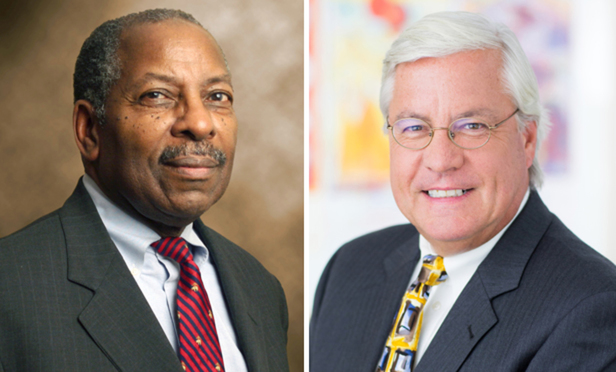George Bundy Smith

December 17, 2015 | New York Law Journal
Applying the Doctrine of Incorporation by EstoppelIn their Commercial Division Update, George Bundy Smith and Thomas J. Hall write: Several Commercial Division cases make clear that at times a non-existent corporation can be deemed to exist, and thus possess the legal capacity to contract and bring suit on that contract, pursuant to the common law doctrine of incorporation by estoppel.
By George Bundy Smith and Thomas J. Hall
11 minute read

October 16, 2015 | New York Law Journal
Pleading Breach Claims in TandemIn their Commercial Division Update, George Bundy Smith and Thomas J. Hall write: While at times a claim for breach of the implied covenant of good faith and fair dealing would seem to pair with a claim for breach of contract, New York courts frequently find these claims to be duplicative when pleaded together, resulting in dismissal of the good faith claim. A number of recent Commercial Division cases demonstrate the circumstances under which such tandem pleading can and cannot survive.
By George Bundy Smith and Thomas J. Hall
10 minute read

August 21, 2015 | New York Law Journal
Shareholder Claims: Direct or Derivative?In their Commercial Division Update, George Bundy Smith and Thomas J. Hall analyze recent decisions demonstrating that, although a clearly enunciated test for distinguishing direct shareholder claims from derivative claims now exists, its application is not always clear.
By George Bundy Smith and Thomas J. Hall
11 minute read

August 20, 2015 | New York Law Journal
Shareholder Claims: Direct or Derivative?In their Commercial Division Update, George Bundy Smith and Thomas J. Hall analyze recent decisions demonstrating that, although a clearly enunciated test for distinguishing direct shareholder claims from derivative claims now exists, its application is not always clear.
By George Bundy Smith and Thomas J. Hall
11 minute read

June 19, 2015 | New York Law Journal
'At-Issue' Waiver of Attorney-Client PrivilegeIn their Commercial Division Update, George Bundy Smith and Thomas J. Hall write that a number of recent cases demonstrate that if reliance on privileged materials is needed to prove a claim or defense, the courts usually will find that the privilege has been waived. However, the relevance of privileged materials is not the determining factor in at-issue waivers; rather, the privileged materials must be directly at issue in the case.
By George Bundy Smith and Thomas J. Hall
12 minute read

June 18, 2015 | New York Law Journal
'At-Issue' Waiver of Attorney-Client PrivilegeIn their Commercial Division Update, George Bundy Smith and Thomas J. Hall write that a number of recent cases demonstrate that if reliance on privileged materials is needed to prove a claim or defense, the courts usually will find that the privilege has been waived. However, the relevance of privileged materials is not the determining factor in at-issue waivers; rather, the privileged materials must be directly at issue in the case.
By George Bundy Smith and Thomas J. Hall
12 minute read

April 17, 2015 | New York Law Journal
Binding Contracts Despite Continuing NegotiationsIn their Commercial Division Update, George Bundy Smith and Thomas J. Hall write that previously, courts often have found that where parties to an alleged contract engaged in subsequent negotiations over material terms of the agreement, no meeting of the minds was reached, and there was no enforceable contract. Courts may now be less inclined to find as such after two recent decisions.
By George Bundy Smith and Thomas J. Hall
10 minute read

April 16, 2015 | New York Law Journal
Binding Contracts Despite Continuing NegotiationsIn their Commercial Division Update, George Bundy Smith and Thomas J. Hall write that previously, courts often have found that where parties to an alleged contract engaged in subsequent negotiations over material terms of the agreement, no meeting of the minds was reached, and there was no enforceable contract. Courts may now be less inclined to find as such after two recent decisions.
By George Bundy Smith and Thomas J. Hall
10 minute read

February 20, 2015 | New York Law Journal
Merger Clauses and Parol Evidence RuleIn their Commercial Division Update, George Bundy Smith and Thomas J. Hall write: In New York, the existence of a merger clause in a contract appears to have little effect on a court's willingness to admit parol evidence to clarify an ambiguity. But what if a party seeks to use extrinsic evidence, not to clarify an ambiguity, but to establish that a separate agreement exists and must be considered in deciding the dispute under the written contract in question?
By George Bundy Smith and Thomas J. Hall
11 minute read

February 19, 2015 | New York Law Journal
Merger Clauses and Parol Evidence RuleIn their Commercial Division Update, George Bundy Smith and Thomas J. Hall write: In New York, the existence of a merger clause in a contract appears to have little effect on a court's willingness to admit parol evidence to clarify an ambiguity. But what if a party seeks to use extrinsic evidence, not to clarify an ambiguity, but to establish that a separate agreement exists and must be considered in deciding the dispute under the written contract in question?
By George Bundy Smith and Thomas J. Hall
11 minute read
More from ALM
- Legal Speak at General Counsel Conference East 2024: Match Group's Katie Dugan & Herrick's Carol Goodman 1 minute read
- Legal Speak at General Counsel Conference East 2024: Eric Wall, Executive VP, Syllo 1 minute read
- Legal Speak at General Counsel Conference East 2024: Virginia Griffith, Director of Business Development at OutsideGC 1 minute read



